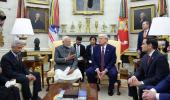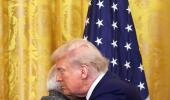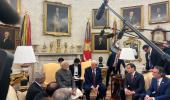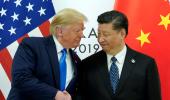'A less tense US-China relationship would make Beijing less likely to provoke India -- including on the border -- in retaliation for its close defence ties with the US.'

"India-US relationship has gotten through a lot in recent years -- including some bumpy moments, like a mini trade war, during the first Trump administration," observes Dr Michael Kugelman, Director of the South Asia Institute at the Wilson Center.
Dr Kugleman is the editor and co-editor of 11 books and a leading specialist on Afghanistan, India and Pakistan and their relations with the United States.
"Ultimately, the Indo-US relationship will be OK -- and indeed likely continue a two-decade-long pattern of growing exponentially," he tells Rediff.com's Archana Masih in the concluding part of the interview on the Modi-Trump meeting in the White House.
- Part 1 of the Interview: 'Modi-Trump Reconnect Went Swimmingly'
President Trump offered to negotiate on the India-China dispute and said China is 'an important player in the world'.
What does Mr Trump's stance on China (he plans to meet Xi Jinping soon and does not seem to be in the mood to provoke China) mean for India and for India-China relations?
I actually see this offer as a non-starter, much like Trump's previous offer to mediate the Kashmir dispute -- he had said he'd do it if both sides agreed, and naturally India wasn't going to agree.
The India-China dispute doesn't need external mediation; there have been regular high-level bilateral discussions on the border, which resulted in a border accord last year.
India and China may be competitors and rivals, and mistrust has grown since the Ladakh crisis, but it's not a hostile relationship.
They work together in various multilateral forums, they do a lot of bilateral trade, and they share many policy interests (from taking a strong stand against Islamist terrorism to supporting non-Western-led economic models).
New Delhi has already made clear that Trump's offer need not be embraced.
The broader issue of Trump's view on China is interesting. He seems to want to intensify economic competition with China. But he doesn't want the US to get dragged into a conflict with China.
So he may seek to ease tensions with China, even if modestly. This would have implications for US-India relations, given that shared concern about China is the glue that binds the US-India strategic partnership.
But then again, an easing of US-China tensions might actually be beneficial for India, which itself has sought to reduce tensions with Beijing in recent months.
A less tense US-China relationship would make Beijing less likely to provoke India -- including on the border -- in retaliation for its close defence ties with the US.

Has Mr Trump's utterance that he leaves Bangladesh to Prime Minister Modi given boost and greater leverage to India in dealing with the problems in the neighbourhood?
This has been one of the most curious developments of Modi's visit. My sense is that Trump was simply saying that he would leave it to Modi to answer the question he received about Bangladesh, and that Modi is more well placed to respond to such a question given that Modi and India have so much more familiarity with Bangladesh.
I don't think Trump was suggesting that Modi should do what he wants with Bangladesh, on a policy level. That said, I do think India will sense an opportunity: Trump clearly won't support the way that the Biden administration left the relationship with Dhaka, with the US pledging to help the Yunus government rebuild the country and promising ample assistance.
Trump has no interest in that type of relationship with Bangladesh, or with any country. I suspect Modi might have spoken to Trump, during their meeting, about his concerns about Bangladesh.
Trump, who wants the US to do less in the world, might in due course be comfortable with the idea of deferring to a trusted partner's policy in Bangladesh, which sits in a region that won't be viewed with much strategic significance in Trump's Washington -- at least relative to East Asia, the Middle East, and Europe.
Do you feel India would have wanted a firmer statement about cross-border terrorism from Pakistan?
I don't think so. These days, India is more worried about other issues, like its slowing economy, and the China challenge. It certainly remains concerned about Pakistani terrorism risks, but it believes it has that well managed.
Also, Trump's announcement that the US has signed off on [Tahawwur] Rana's extradition is a major development, one of the biggest outcomes of the summit, and, of course, something that has been received very positively in New Delhi.

Will the Panun controversy be resolved/overlooked by the Trump administration which was a sore point with the Biden government?
This is a tough one, as there are conflicting data points. On the one hand, Trump has nominated a prominent Sikh rights activist, Harmeet Dhillon, to lead the Justice Department's civil rights division.
Also, Trump's own nationalist politics suggest he will not take lightly serious allegations of the Indian government being involved in a major violation of US sovereignty -- and especially in New York City, his home town.
But on the other hand, the post-summit joint statement says that the US and India will cooperate to take 'decisive action' against anyone that threatens the 'sovereignty and territorial integrity' of the US and India -- a clear reference to Khalistan supporters.
This is a major shift from the Biden administration's policy.
Ultimately, I imagine Trump will let the indictment related to the Pannun case play out, but his administration will not go out of its way to engage with Khalistan supporters. And it will be more sympathetic to Indian concerns about the violent threat posed by Khalistan supporters in the US.

How do you see the course of India-US relations in the next four years?
For the most part, smooth sailing ahead. The special Trump-Modi relationship, the robust champions of partnership with India in the Trump administration, the level of familiarity the Modi government has with Trump (most Modi Cabinet ministers were in power during Modi's second term, which overlapped with Trump's first), the multifaceted nature of the relationship which has built up trust and goodwill, the fact that tension points from the Biden administration -- Russia, criticism of human rights -- will melt away -- all this bodes well for the partnership.
There will be challenges, though, and especially as the adjustment is made to a relationship that will take on a more transactional edge to it, and that will feature some uncomfortable discussions on issues important to the Trump administration, particularly trade and immigration.
But this relationship has gotten through a lot in recent years -- including some bumpy moments, like a mini trade war, during the first Trump administration.
Ultimately, the relationship will be OK -- and indeed likely continue a two-decade-long pattern of growing exponentially.
Feature Presentation: Aslam Hunani/Rediff.com











 © 2025
© 2025